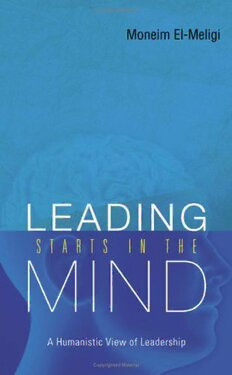
Leading Starts in the Mind: A Humanistic View of Leadership PDF
231 Pages·2005·5.654 MB·English
Most books are stored in the elastic cloud where traffic is expensive. For this reason, we have a limit on daily download.
Preview Leading Starts in the Mind: A Humanistic View of Leadership
Description:
This book offers a refreshing view of leadership as a psycho-social phenomenon. Attention is drawn to the conceptual muddle which underlies much of managerial practices, particularly in the selection and development of future leaders. Also demonstrated is the conceptual muddle through semantic analysis of the vocabulary used in defining leadership in different languages. The concept of leadership from four different perspectives is examined in detail: leadership as a universal and natural phenomenon; membership and social roles; leadership as a collective process; and conceptual models. In addition to the theoretical models, the author discusses patterns of influence and use and abuse of power. Consistent with his emphasis on the reciprocal nature of leadership, he complements his analysis of leading behavior by insightful analysis of the phenomenon of obedience: the psychological and cultural foundations of obedience; patterns of obedience; the collusion of leaders and followers in the abuse of power. The author's conceptualization of leadership challenges much of our conventional wisdom and traditional notions. He questions, for example, the universality of intelligence, dominance, aggressiveness and extroversion as predictors of leadership potential. Instead of imposing an ideal model of leadership, he lays the philosophical foundations that allow institutions to make their own choice of the model (or models) best suited for their values and unique historical circumstances. As such, the book can best be described as an interdisciplinary and cross-cultural guide for policy makers, particularly those concerned with the selection and training of leaders.
See more
The list of books you might like
Most books are stored in the elastic cloud where traffic is expensive. For this reason, we have a limit on daily download.
